The Ultimate Guide to AI Shopping Assistants
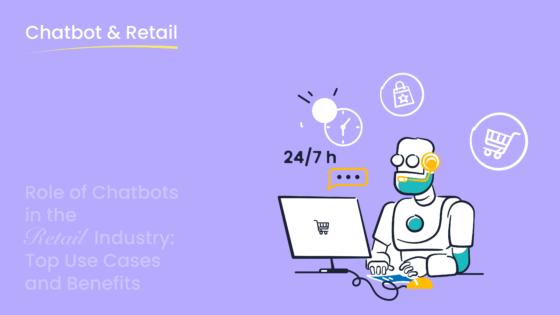
Imagine walking into a store where the best AI shopping assistant knows exactly what you need before you even ask. That’s the magic of AI shopping assistants. These intelligent tools analyze your preferences, predict your needs, and offer personalized suggestions that make shopping easier than ever. By 2025, they’ll shape the future of eCommerce, driving efficiency and boosting engagement. For instance, AI-powered recommendations are already increasing average purchase values by 30%. With 80% of businesses adopting AI chatbots, customer interactions will become faster and smarter.

One standout solution in this space is Sobot, offering a versatile AI chatbot that handles queries 24/7, boosts conversions, and saves costs. This tool empowers businesses to deliver seamless shopping experiences while keeping operations efficient. Whether you’re looking for personalized recommendations or real-time support, Sobot’s chatbot ensures you’re always one step ahead.
Understanding AI Shopping Assistants
What Are AI Shopping Assistants?
AI shopping assistants are intelligent tools designed to make your shopping journey smoother and more enjoyable. These assistants use artificial intelligence to understand your preferences, predict your needs, and provide tailored solutions. Whether you're browsing for a new gadget or looking for the perfect outfit, they guide you every step of the way. Think of them as your personal shopping companion, available 24/7 to answer questions, recommend products, and even help you complete transactions.

These assistants come in various forms, such as chatbots, virtual assistants, and voice-activated tools. For example, Sobot's AI-powered chatbot is a standout solution that handles customer queries in real-time, offering personalized recommendations and boosting conversions. By integrating seamlessly with platforms like WhatsApp and SMS, it ensures you get the help you need, wherever you are.
Key Features of AI Shopping Assistants
AI shopping assistants are packed with features that redefine how you shop. Here are some of the key ones:
- Personalization: They analyze your shopping habits and preferences to offer personalized product recommendations, creating a unique shopping experience tailored just for you.
- Real-Time Support: Need help immediately? These assistants provide instant answers, ensuring you never have to wait.
- Omnichannel Integration: They work across multiple platforms, from websites to social media, making it easy to shop wherever you prefer.
- Multilingual Capabilities: Language barriers? Not a problem. Many AI shopping assistants, like Sobot's chatbot, can communicate in multiple languages.
- Data-Driven Insights: They use advanced analytics to understand trends and improve their recommendations over time.
These features not only enhance your shopping experience but also make the process faster and more efficient. For instance, businesses using AI assistants have reported a 40% higher add-to-cart rate and an 85% increase in conversion rates.
Why AI Shopping Assistants Are Essential for eCommerce in 2025
The eCommerce industry is evolving rapidly, and AI shopping assistants are at the forefront of this transformation. By 2025, 84% of eCommerce businesses are expected to adopt AI, driving a global market size of $13.9 billion. But why are these assistants so crucial?
- Enhanced Personalization: AI shopping assistants excel at understanding your preferences and delivering personalized shopping experiences. This level of personalization not only boosts customer satisfaction but also increases sales.
- Efficiency and Speed: They streamline the shopping process, helping you find what you need faster. With AI, the average customer query resolution time has dropped to just 5.4 minutes.
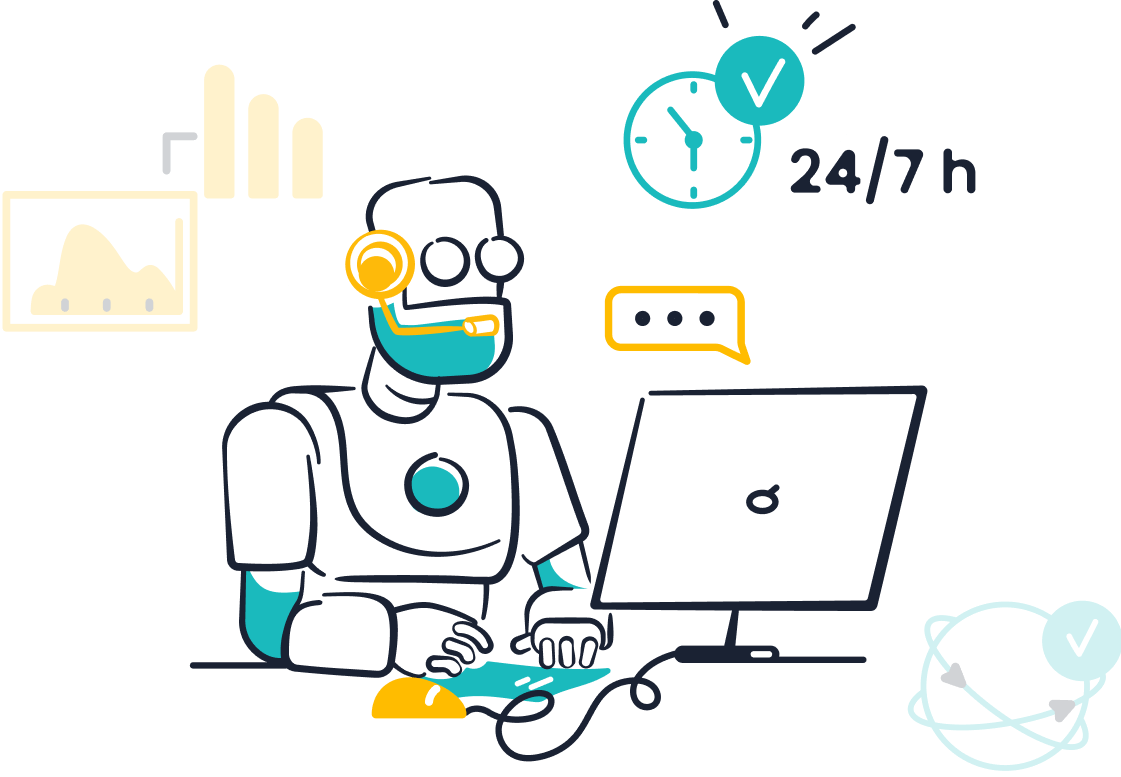
- Increased Engagement: These assistants keep you engaged by offering tailored recommendations and solving complex problems. For example, Sobot's chatbot uses proactive messaging to guide you through your shopping journey.
- Data-Driven Decisions: Businesses benefit from the insights these assistants provide, helping them optimize their strategies and improve customer retention.
- Future-Proofing eCommerce: As consumer expectations rise, AI shopping assistants ensure businesses stay competitive by offering cutting-edge solutions.
The adoption of AI in eCommerce has grown exponentially, as shown in the chart below:
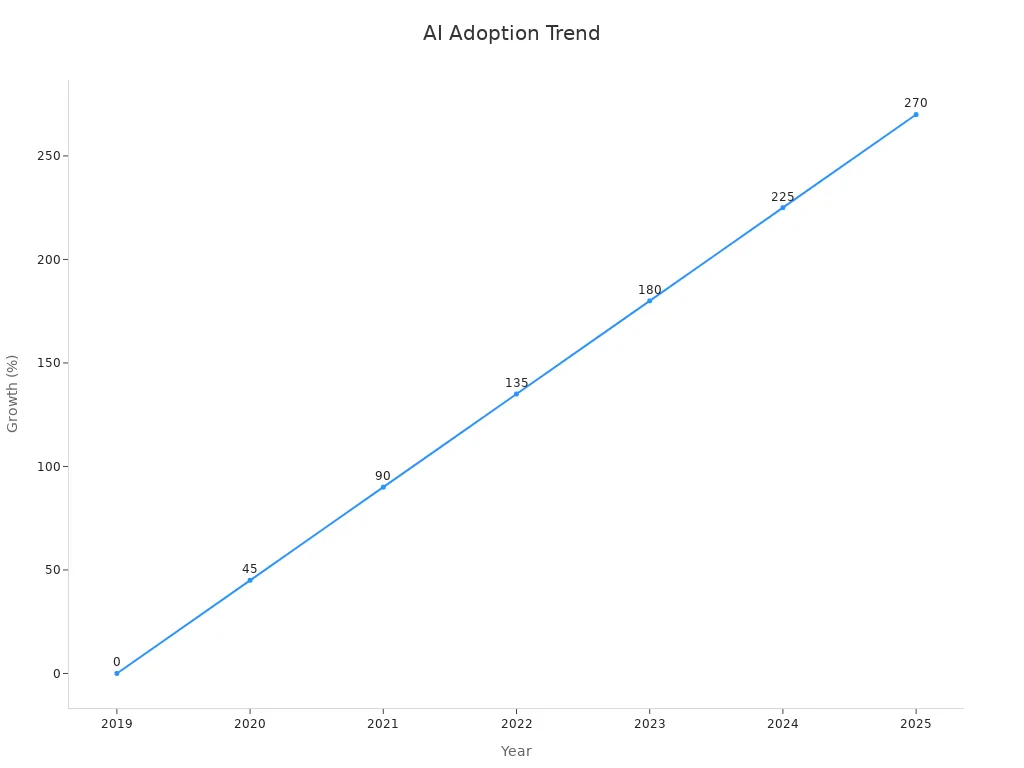
This growth highlights the increasing reliance on AI to deliver seamless, personalized shopping experiences. Whether you're a shopper or a business owner, AI shopping assistants are shaping the future of eCommerce.
Types of AI Shopping Assistants
AI shopping assistants come in various forms, each designed to enhance your shopping experience in unique ways. Let’s explore three of the most impactful types.
Chatbots for Customer Support
Chatbots are the backbone of AI-powered customer support. They’re like your personal shopping concierge, ready to assist you 24/7. These AI tools handle everything from answering simple questions to resolving complex issues, all in real time. For instance, Sobot’s AI chatbot excels in this area. It operates across multiple channels like WhatsApp and SMS, providing instant responses and multilingual support. This ensures you get help whenever and wherever you need it.
What makes chatbots so effective? Their ability to deliver quick, accurate, and cost-efficient solutions. Businesses using chatbots often see a significant boost in customer satisfaction and operational efficiency. Here’s a quick look at the metrics that showcase their performance:
| Metric | Description |
|---|---|
| Response Time | The time taken by the chatbot to respond to a client’s query, indicating efficiency and customer satisfaction. |
| Resolution Rate | The percentage of customer inquiries successfully addressed by the chatbot without human intervention. |
| Customer Satisfaction Score | A measure of customer satisfaction based on post-interaction surveys regarding the chatbot's performance. |
| Net Promoter Score | A metric indicating customer loyalty and likelihood to recommend the service to others. |
| Cost Per Resolution | The cost incurred by the business for each query handled by the chatbot, reflecting financial efficiency. |
| User Retention Rate | A measure of long-term customer satisfaction and willingness to continue using the service. |
| Error Rate | The frequency of incorrect or unhelpful responses provided by the chatbot, impacting customer experience. |
With these capabilities, chatbots like Sobot’s not only save time but also reduce costs by up to 50%, making them a game-changer for businesses and shoppers alike.
Virtual Shopping Assistants
Virtual shopping assistants take personalization to the next level. They’re like having a knowledgeable friend who knows your preferences and helps you find exactly what you need. These AI tools engage you with tailored recommendations, guide you through the shopping process, and even answer your questions. Imagine browsing for a new outfit, and the assistant suggests the perfect accessories to match—it’s like having a stylist in your pocket.
Here’s why virtual shopping assistants are so effective:
- They provide 24/7 support, ensuring you’re never left waiting for help.
- By personalizing interactions, they make your shopping journey smoother and more enjoyable.
- They strengthen customer relationships, boosting loyalty and engagement.
Did you know that 47% of Gen Z and 46% of Millennials actively seek personalized product recommendations? Virtual shopping assistants meet this demand by mimicking real-world shopping experiences. They transform your online journey into something interactive and engaging, making every click count.
Voice-Activated Shopping Assistants
Imagine asking your device, “What’s the best deal on sneakers today?” and getting an instant answer. That’s the power of voice-activated shopping assistants. These AI-driven tools let you shop hands-free, making your experience faster and more convenient. Whether you’re cooking, driving, or simply multitasking, they’re there to help.
Voice technology is becoming a favorite among shoppers. Here’s what the numbers say:
- 18% of consumers use voice technology for shopping weekly.
- 30% of Gen Z and 28% of millennials shop this way just as often.
- 16% of consumers even pay using voice commands weekly.
These assistants don’t just make shopping easier—they make it smarter. They can remember your preferences, suggest products you might like, and even help you reorder items you’ve purchased before. For example, Sobot’s AI solutions could easily integrate with voice platforms to provide seamless, personalized shopping experiences. Imagine asking your assistant to find a specific product, and it not only locates it but also checks for discounts or bundle deals.
Voice-activated shopping assistants are also transforming how businesses interact with customers. By integrating with smart home devices, they create a connected ecosystem where shopping feels natural and effortless. As more people embrace this technology, it’s clear that voice is the future of eCommerce.
AI-Powered Price Trackers and Deal Finders
Who doesn’t love a good deal? AI-powered price trackers and deal finders are your secret weapon for saving money. These tools monitor prices in real time, alerting you when it’s the perfect moment to buy. Whether you’re booking a flight or hunting for a new gadget, they ensure you never overpay.
For travelers, these tools are a game-changer. They track airfare fluctuations and notify you when prices drop. They even uncover hidden deals that most people miss, helping you save big on your next trip. The same applies to everyday shopping. These AI systems detect fleeting discounts and alert you instantly, so you can snag the best deals before they’re gone.
Businesses also benefit from these tools. By integrating AI-powered price trackers, they can offer competitive pricing and attract more customers. Sobot’s AI solutions, for instance, could help eCommerce platforms analyze market trends and adjust prices dynamically, ensuring both shoppers and sellers get the best value.
With AI doing the heavy lifting, you can focus on enjoying your purchases while knowing you got the best deal possible. It’s like having a personal bargain hunter working around the clock.
Comparing the Best AI Shopping Assistants in 2025
Overview of the Best AI Shopping Assistants
The eCommerce industry in 2025 is buzzing with innovation, and AI shopping assistants are leading the charge. These tools have become indispensable for businesses and shoppers alike, offering personalized experiences, real-time support, and data-driven insights. But with so many options available, how do you identify the best AI shopping assistant for your needs?
Let’s take a closer look at how these assistants are transforming the way we shop. For instance, App0, a popular AI shopping assistant, has helped businesses achieve an 8.5% increase in orders and a 17% boost in conversion rates. This highlights the growing trust in AI-powered solutions to enhance shopping experiences.
Here’s what users are relying on AI shopping assistants for:
| Metric | Percentage | Description |
|---|---|---|
| Conducting research | 55% | Users gathering information about products. |
| Getting product recommendations | 47% | Users requesting tailored AI suggestions. |
| Seeking deals | 43% | Users instructing AI to find discounts. |
| Finding different products | 35% | Users searching for items not found traditionally. |
| Getting gift ideas | 35% | Users using AI for gift inspiration. |
| Creating shopping lists | 33% | Users allowing AI to organize purchasing needs. |
As you can see, these assistants are becoming the go-to solution for everything from finding deals to creating shopping lists. With 58% of consumers now preferring AI over traditional search engines for product recommendations, it’s clear that AI shopping assistants are reshaping the eCommerce landscape.
Key Features and Capabilities of Leading Tools
The best AI shopping assistants in 2025 share several standout features that make them indispensable. Here’s what you should look for when evaluating these tools:
- Personalization: The ability to analyze your preferences and recommend products tailored to your needs. This feature enhances your shopping experience and boosts satisfaction.
- Omnichannel Support: Seamless integration across platforms like websites, apps, and social media ensures you can shop wherever you prefer.
- Real-Time Assistance: Instant responses to your queries save time and make the process smoother.
- Multilingual Capabilities: Communication in multiple languages breaks down barriers and makes shopping accessible to everyone.
- Data-Driven Insights: Advanced analytics help businesses optimize their strategies and improve customer retention.
Here’s a quick comparison of user feedback on these features:
| Statistic | Value |
|---|---|
| Consumer satisfaction with voice assistants | 80% |
| Users sharing positive experiences | 90% |
| Users developing a favorable view of the retailer | 36% |
| Users increasing spending with the retailer | 24% |
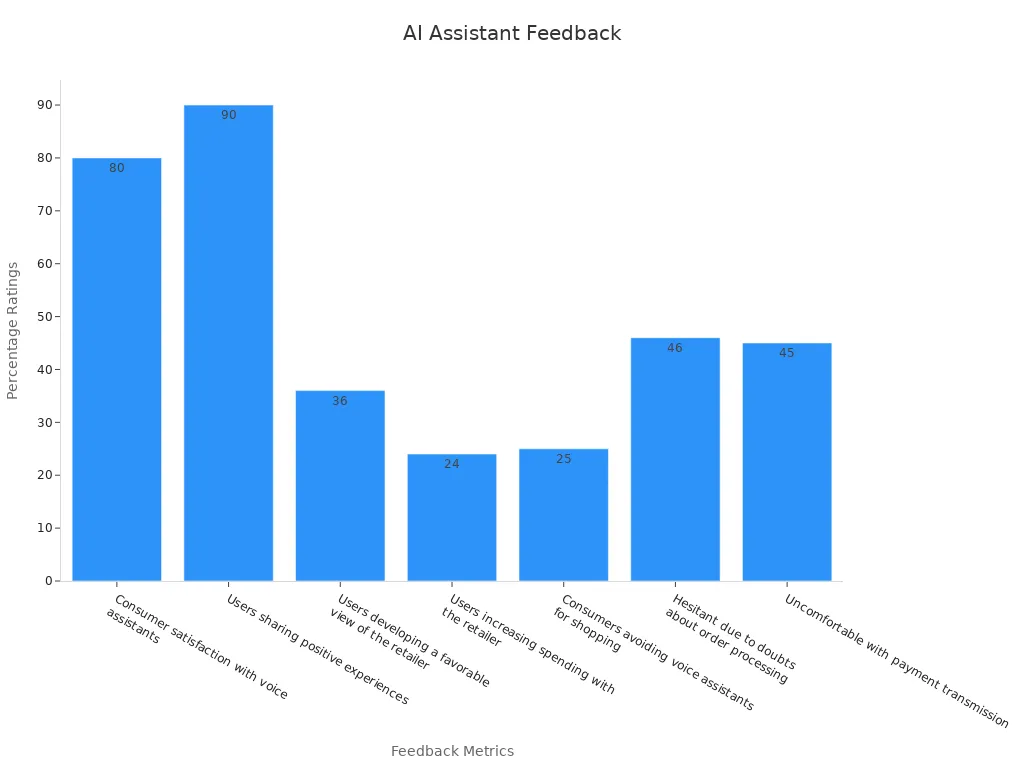
These features not only enhance the shopping experience but also drive business growth. For example, AI-referred visitors spend 8% more time on retail sites and view 12% more pages per visit compared to other traffic sources. This shows how AI shopping assistants are becoming a vital part of the eCommerce ecosystem.
Sobot Chatbot: A Leader in AI Shopping Assistance
When it comes to choosing the best AI shopping assistant, Sobot’s AI-powered chatbot stands out as a top contender. Designed to enhance efficiency and personalization, this tool is a game-changer for businesses and shoppers alike.
Here’s what makes Sobot’s chatbot a leader in the field:
- 24/7 Availability: It operates round the clock, ensuring you get support whenever you need it.
- Multilingual Support: Communicate in your preferred language without any hassle.
- Omnichannel Integration: Whether you’re on WhatsApp, SMS, or a website, Sobot’s chatbot is there to assist.
- No Coding Required: Its point-and-click interface makes it easy to set up and customize.
- Cost Savings: By automating repetitive tasks, it reduces operational costs by up to 50%.
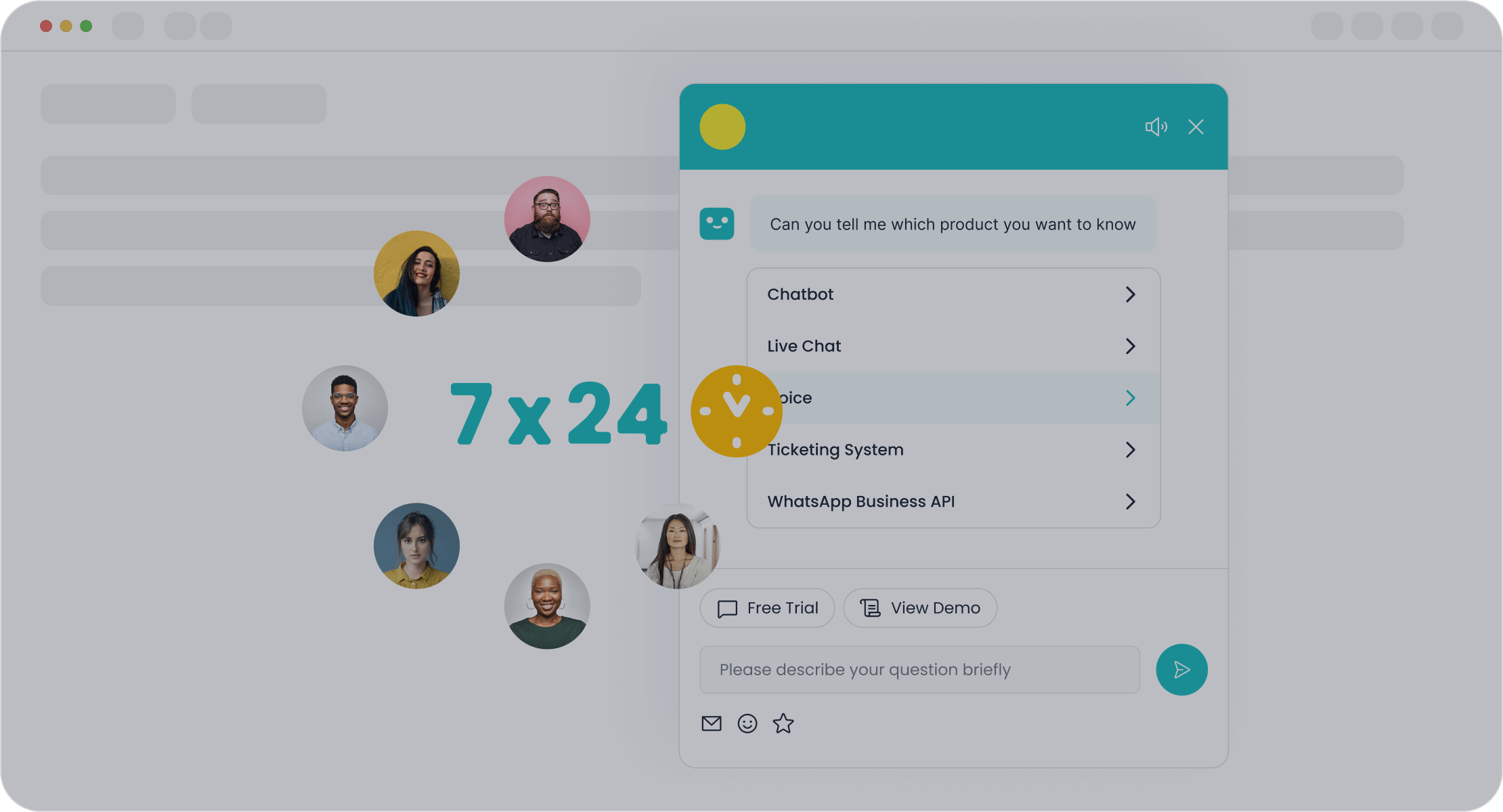
Businesses using Sobot’s chatbot have reported a 70% improvement in productivity and a 20% boost in conversions. For example, OPPO, a global leader in smart devices, achieved an 83% chatbot resolution rate and a 57% increase in repurchase rates after implementing Sobot’s solutions.
Sobot’s chatbot doesn’t just answer questions—it transforms the entire shopping experience. Whether you’re a business looking to optimize operations or a shopper seeking personalized recommendations, this tool delivers unmatched value.
Ideal Use Cases for Each AI Shopping Assistant
Not all AI shopping assistants are created equal. Each type shines in specific scenarios, making it essential to match the right tool to your needs. Let’s explore where these assistants excel.
-
Chatbots for Customer Support
Chatbots are perfect for handling high volumes of customer inquiries. If you run an ecommerce store with frequent questions about shipping, returns, or product details, a chatbot can save the day. For example, Sobot’s AI chatbot operates 24/7, resolving repetitive queries instantly. This frees up your team to focus on more complex issues. Businesses like OPPO have seen an 83% resolution rate using Sobot’s chatbot, proving its effectiveness during peak shopping seasons. -
Virtual Shopping Assistants
These assistants are ideal for creating personalized shopping experiences. Imagine you’re running a fashion store. A virtual assistant can recommend outfits based on a shopper’s preferences, boosting engagement and sales. They’re also great for upselling. For instance, suggesting matching accessories or complementary products can increase the average order value by 20%. -
Voice-Activated Shopping Assistants
Voice assistants work best for hands-free shopping. They’re a hit with busy customers who want to multitask. Whether someone’s cooking dinner or driving, they can ask for product recommendations or reorder essentials. These assistants also integrate seamlessly with smart home devices, making them a natural fit for tech-savvy shoppers. -
AI-Powered Price Trackers and Deal Finders
If your customers love hunting for bargains, price trackers are a must. These tools monitor prices and alert users when discounts appear. They’re especially useful for travel bookings or seasonal sales. Businesses can also use them to adjust pricing dynamically, staying competitive in the ecommerce industry.
By choosing the right AI shopping assistant for your needs, you can enhance customer satisfaction and streamline operations. Whether it’s a chatbot for quick support or a virtual assistant for personalized recommendations, these tools are transforming the way we shop.
Pricing and Accessibility of Top AI Shopping Assistants
When it comes to adopting an AI shopping assistant, pricing and accessibility play a huge role. Let’s break down what you can expect.
-
Pricing Models
Most AI shopping assistants follow one of these pricing structures:- Subscription-Based: You pay a monthly or annual fee. This is common for tools like chatbots and virtual assistants.
- Pay-As-You-Go: Ideal for businesses with fluctuating needs, this model charges based on usage.
- Custom Pricing: Some providers offer tailored plans based on your business size and requirements.
For example, Sobot offers flexible pricing for its AI chatbot, ensuring businesses of all sizes can benefit. With its cost-saving features, like reducing agent workload by 50%, the investment often pays for itself.
-
Accessibility
Accessibility is about more than just cost. It’s also about ease of use and integration. The best AI shopping assistants are:- User-Friendly: Tools like Sobot’s chatbot require no coding, making them accessible even for non-tech-savvy users.
- Omnichannel: They work across platforms like WhatsApp, SMS, and websites, ensuring you can reach customers wherever they are.
- Scalable: Whether you’re a small business or a global brand, these tools grow with you.
-
Free Trials and Demos
Many providers offer free trials or demos, letting you test the waters before committing. This is a great way to see if the assistant meets your needs. Sobot, for instance, provides a demo of its AI-powered solutions, so you can experience its capabilities firsthand.
Investing in an AI shopping assistant doesn’t have to break the bank. With flexible pricing and accessible features, these tools are within reach for businesses of all sizes. They’re not just a cost—they’re an investment in better customer experiences and higher sales.
Benefits of Using AI Shopping Assistants

Enhanced Personalization and Recommendations
Imagine walking into a store where every product feels like it was chosen just for you. That’s the magic of AI shopping assistants. These tools analyze your preferences, shopping habits, and even browsing history to deliver personalized recommendations that make your shopping journey effortless. For example, personalized product recommendations now account for up to 31% of e-commerce site revenues, and conversion rates can increase by a staggering 288% when recommendations are tailored to individual needs.
AI shopping assistants don’t just suggest products—they create a better shopping experience. They reduce cart abandonment by up to 4.35% and boost customer loyalty, with 76% of shoppers more likely to purchase from brands offering personalization. Sobot’s AI chatbot excels in this area, using advanced personalization capabilities to guide you through your shopping journey with real-time assistance. Whether you’re looking for a specific product or exploring new options, these assistants make every interaction feel personal and meaningful.
High customer satisfaction scores (85% rating 4 or 5 out of 5) show how personalization enhances the shopping experience, leading to repeat business and stronger customer relationships.
Time and Cost Savings for Shoppers
Shopping can be time-consuming, but AI shopping assistants simplify the process. They use smart recommendations based on your previous purchases and browsing history, helping you find what you need faster. Features like voice and image search make it even easier to locate products, saving you valuable time. These assistants also send reminder alerts to reduce cart abandonment, ensuring you don’t miss out on items you wanted to buy.
The impact on costs is equally impressive. AI helps businesses optimize operations, which translates to savings for you. For instance, 72% of retailers report decreased costs thanks to AI, while 69% see increased revenue. Sobot’s AI chatbot operates 24/7, handling repetitive queries and reducing operational costs by up to 50%. This efficiency benefits both businesses and shoppers, making AI shopping assistants a win-win solution.
With AI, you get a faster, smarter shopping experience while saving money—what’s not to love?
Improved Customer Support and Engagement
AI shopping assistants redefine customer support. They provide instant responses, ensuring you never have to wait for help. This immediacy boosts satisfaction, with 68% of consumers reporting higher happiness levels due to quick replies. Assistants like Sobot’s chatbot also improve engagement by offering proactive messaging and personalized solutions.
The numbers speak for themselves. First contact resolution rates improve by 15-25%, and Net Promoter Scores rise by an average of 16 points with AI-powered service. Businesses benefit too, with cost per interaction dropping by 30-50%. Sobot’s chatbot integrates seamlessly across platforms like WhatsApp and SMS, making customer interactions smooth and efficient.
AI shopping assistants don’t just answer questions—they create meaningful connections that keep you coming back.
Seamless Omnichannel Shopping Experiences
Have you ever started shopping on your phone, switched to your laptop, and then completed the purchase in-store? That’s the magic of a seamless omnichannel shopping experience. It’s all about making your journey smooth, no matter where or how you shop. With AI, businesses can connect every touchpoint, ensuring you get consistent support and personalized recommendations across platforms.
For example, imagine browsing a product on a retailer’s app. Later, you receive an email with a discount for that exact item. When you visit the store, the assistant already knows your preferences and suggests complementary products. This level of seamless integration isn’t just convenient—it’s transformative. Studies show that businesses with strong omnichannel strategies retain 89% of their customers, compared to just 33% for those without.
Sobot’s AI chatbot takes this to the next level. It integrates with platforms like WhatsApp, SMS, and websites, ensuring you get real-time assistance wherever you are. Whether you’re asking about product availability or tracking an order, the chatbot keeps your experience consistent and effortless. This kind of omnichannel support doesn’t just improve customer satisfaction—it drives conversion rates and builds loyalty.
Tip: Businesses that adopt omnichannel AI solutions see a 30% increase in lifetime customer value. It’s not just about selling—it’s about creating a better shopping experience.
Data-Driven Decision Making for eCommerce Businesses
Data is the backbone of modern eCommerce. But raw numbers don’t mean much without insights. That’s where AI comes in. It analyzes customer behavior, shopping trends, and product performance to help businesses make smarter decisions.
Let’s say you run an online store. AI can show you which products are flying off the shelves and which ones need a boost. It can even predict future trends, helping you stock up on what customers will want next. This isn’t guesswork—it’s data-driven precision. Businesses using AI for analytics report a 25% increase in efficiency and a 20% boost in sales.
Sobot’s AI solutions shine here. They provide detailed reports on customer interactions, product preferences, and shopping patterns. These insights help you optimize your marketing strategies, reduce cart abandonment, and improve your personalized product recommendations. For instance, if data shows that customers often pair two items, you can bundle them for a higher conversion rate.
Note: Data-driven decisions don’t just improve sales—they create a personalized shopping experience that keeps customers coming back.
Trends Shaping AI Shopping Assistants in 2025

Hyper-Personalization and Predictive Analytics
Imagine walking into a store where every product feels like it was handpicked for you. That’s the power of hyper-personalization. AI shopping assistants are evolving to anticipate your needs before you even express them. By analyzing your browsing history, past purchases, and preferences, these tools create a truly personalized shopping experience. For example, predictive analytics can suggest the perfect pair of shoes to match a jacket you recently bought.
Retailers are embracing this trend to boost engagement and loyalty. AI doesn’t just stop at recommendations—it helps businesses optimize inventory, ensuring popular products are always in stock. This means fewer “out of stock” disappointments for you. Companies like Sobot are leading the charge, offering AI solutions that analyze customer data to deliver tailored recommendations and improve satisfaction.
Fun fact: Predictive analytics in eCommerce has been shown to increase conversion rates by up to 288%, making it a game-changer for businesses and shoppers alike.
Virtual Try-Ons and Augmented Reality Integration
Have you ever wished you could try on clothes or test furniture without leaving your home? Virtual try-ons and augmented reality (AR) are making that possible. These technologies let you see how a product looks or fits before you buy it. Whether it’s trying on glasses or placing a virtual couch in your living room, AR creates an interactive and engaging shopping experience.
This trend is exploding. The global virtual try-on market was valued at $9.17 billion in 2023 and is expected to grow at a staggering 26.4% CAGR through 2030. Shoppers love it—61% prefer retailers that offer AR experiences. Businesses benefit too, as AR product displays are 200% more engaging than traditional ones. Sobot’s AI solutions can seamlessly integrate with AR platforms, helping eCommerce brands offer cutting-edge experiences that keep customers coming back.
Ethical AI and Data Privacy Concerns
As AI becomes smarter, ethical concerns are growing. You might wonder, “How is my data being used?” That’s a valid question. AI shopping assistants rely on data to deliver personalized experiences, but businesses must ensure this data is handled responsibly. Transparency and compliance with regulations like GDPR are now non-negotiable.
Sobot prioritizes ethical AI by offering solutions that are secure and data-compliant. Features like encryption and continuous backups protect your information. This commitment builds trust, which is essential in today’s digital world. When businesses use AI responsibly, they not only safeguard your privacy but also foster loyalty.
Tip: Always check if a retailer’s AI tools comply with data protection laws. It’s your right to shop securely.
Integration with Smart Home Devices
Imagine asking your smart speaker to find the perfect product for your needs or reorder your favorite items without lifting a finger. That’s the magic of integrating AI shopping assistants with smart home devices. This combination is revolutionizing how you shop, making the experience faster, easier, and more personalized.
Smart home devices like Amazon Echo and Google Nest are already transforming daily life. When paired with AI shopping assistants, they take convenience to a whole new level. You can ask your device for product recommendations, check prices, or even track deliveries—all through simple voice commands. For example, you might say, “Find me the best deal on headphones,” and your assistant will instantly provide options tailored to your preferences.
This integration doesn’t just benefit shoppers—it’s a game-changer for ecommerce businesses too. By connecting AI assistants to smart home devices, businesses can offer seamless shopping experiences that keep customers engaged. Sobot’s AI solutions, for instance, could easily integrate with these devices, enabling real-time support and personalized recommendations. Imagine a customer asking their smart speaker about a product, and Sobot’s chatbot provides instant answers or suggests complementary items.
The numbers back this trend. According to Statista, 35% of U.S. consumers use smart home devices for shopping-related tasks. This figure is expected to grow as more people embrace voice technology. Businesses that adopt this integration can tap into a growing market, boosting customer satisfaction and loyalty.
Tip: If you’re an ecommerce business, integrating AI shopping assistants with smart home devices can increase customer retention by up to 30%. It’s not just about convenience—it’s about creating a connected shopping ecosystem.
AI's Role in Sustainable Shopping Practices
Shopping sustainably is becoming more important than ever. AI is stepping in to help you make eco-friendly choices while transforming how ecommerce businesses approach sustainability. From reducing waste to promoting ethical products, AI is paving the way for greener shopping practices.
AI-powered tools analyze your shopping habits and suggest sustainable alternatives. For example, if you’re browsing for clothing, an AI assistant might recommend products made from recycled materials or brands that prioritize ethical manufacturing. This doesn’t just help the planet—it helps you make informed decisions that align with your values.
Businesses are also leveraging AI to minimize their environmental impact. AI can optimize inventory management, reducing overproduction and waste. It can also analyze supply chains to identify areas for improvement, ensuring products are sourced and delivered sustainably. Sobot’s AI solutions, for instance, could help ecommerce brands track their carbon footprint and suggest ways to reduce it. By integrating AI into their operations, businesses can meet growing consumer demand for sustainability.
The impact is significant. According to McKinsey, 66% of global consumers are willing to pay more for sustainable products. AI helps businesses cater to this demand by promoting eco-friendly options and reducing waste. For shoppers, it means easier access to products that align with their values.
Fun fact: AI-driven sustainability initiatives can reduce operational costs by up to 20%, proving that going green is good for both the planet and the bottom line.
How to Choose the Right AI Shopping Assistant
Assessing Your Shopping Needs
Choosing the right AI shopping assistant starts with understanding your specific needs. Are you looking for real-time support, personalized recommendations, or seamless integration with your existing systems? Identifying these priorities will help you narrow down your options. For example, if your business handles a high volume of customer inquiries, an AI assistant like Sobot’s chatbot can provide 24/7 support while reducing operational costs.
Here are some key factors to consider:
- Real-time context and memory: Does the assistant retain session information for coherent interactions?
- Multimodal communication: Can it handle both voice and text for a smooth experience?
- Integration with e-commerce systems: Is it capable of managing product recommendations and order inquiries?
By aligning your needs with the assistant’s capabilities, you’ll ensure it delivers value to both your business and your customers.
Evaluating Features and Compatibility
Not all AI shopping assistants are created equal. To find the best fit, evaluate their features and how well they integrate with your existing systems. Look for tools that offer:
- Ease of use: A user-friendly interface ensures smooth adoption.
- Personalization: Tailored recommendations enhance customer satisfaction.
- Timely and relevant support: Instant responses keep customers engaged.
| Criteria | Description |
|---|---|
| Integration with Existing Systems | Access to business data and systems is crucial for AI agents to deliver maximum value. |
| Monitor Performance | Establish monitoring practices to track key performance metrics and identify improvement areas. |
| User Experience | Factors like ease of use and personalization significantly impact customer satisfaction. |
Sobot’s chatbot, for instance, excels in omnichannel integration, working seamlessly across platforms like WhatsApp and SMS. It also requires no coding, making it accessible for businesses of all sizes.
Considering Budget and Accessibility
Your budget plays a big role in selecting the right AI shopping assistant. Many tools offer flexible pricing models, such as subscription-based plans or pay-as-you-go options. Sobot provides cost-effective solutions that reduce operational expenses by up to 50%, making it a smart investment for businesses aiming to optimize customer interactions.
Accessibility is equally important. Choose an assistant that’s easy to set up and scalable as your business grows. Free trials or demos can help you test the tool before committing. Sobot’s chatbot, for example, offers a no-coding-required setup and multilingual support, ensuring it’s both user-friendly and versatile.
Tip: Investing in an AI assistant isn’t just about cost—it’s about creating a better shopping experience for your customers.
Reading Reviews and User Feedback
When choosing an AI shopping assistant, reviews and user feedback can be your best friend. They give you a peek into how the assistant performs in real-world scenarios. You’ll find out if it’s reliable, easy to use, and worth the investment. Think of reviews as advice from someone who’s already walked the path you’re about to take.
Start by checking online platforms where users share their experiences. Look for patterns in the feedback. Are people praising the assistant’s ability to provide accurate recommendations? Or are there complaints about slow response times? These insights can help you avoid potential pitfalls. For example, many users of Sobot’s AI chatbot highlight its 24/7 availability and seamless integration with platforms like WhatsApp and SMS. This kind of feedback reassures you that the product delivers on its promises.
Don’t just stop at star ratings. Dive into detailed reviews to understand how the assistant handles specific tasks, like answering customer queries or offering personalized shopping suggestions. If you’re a business owner, pay attention to feedback from companies in your industry. Their experiences can give you a clearer picture of how the assistant might fit into your operations.
Tip: Look for reviews that mention measurable results, like increased customer satisfaction or reduced response times. These details can help you make a more informed decision.
Testing Free Trials or Demos
Free trials or demos are your chance to test the waters before diving in. They let you experience the AI shopping assistant firsthand, so you can see if it meets your needs. During the trial, focus on how well the assistant handles tasks like providing product recommendations or resolving customer inquiries.
Younger shoppers, especially those under 35, are 38% more likely to use AI assistants compared to older consumers. This shows how comfortable they are with technology. If your target audience includes this demographic, a trial can help you gauge whether the assistant aligns with their expectations. For instance, 63% of younger shoppers are more likely to return to brands that offer high-quality AI experiences. A successful demo could boost loyalty and set your business apart.
When testing, pay attention to the assistant’s ease of use and responsiveness. Does it integrate smoothly with your existing systems? Can it handle multilingual queries or provide real-time support? Sobot’s AI chatbot, for example, offers a no-coding-required setup and operates across multiple channels. These features make it a versatile choice for businesses of all sizes.
Tip: Use the trial period to explore all the features. Ask questions, test different scenarios, and involve your team. The more you experiment, the better you’ll understand the assistant’s capabilities.
AI shopping assistants are revolutionizing eCommerce in 2025. They simplify shopping, enhance personalization, and make product discovery faster. These tools analyze your preferences to deliver tailored recommendations, boosting engagement and satisfaction. Technologies like voice search and image recognition make the process even smoother.
According to McKinsey, upselling and cross-selling powered by AI can increase sales by 20% and profits by 30%.
Choosing the right assistant is key. Look for features that match your needs, like real-time support or omnichannel integration. Sobot’s AI chatbot stands out with its 24/7 availability, multilingual support, and cost-saving benefits. It’s a reliable partner for businesses aiming to thrive in the competitive eCommerce landscape.
Stay curious about emerging trends. AI shopping assistants are evolving rapidly, and staying informed ensures you’re always ahead of the curve. 🚀
FAQ
What are AI shopping assistants, and how do they work?
AI shopping assistants are tools that use artificial intelligence to enhance your shopping experience. They analyze your preferences, predict your needs, and provide personalized recommendations. For example, Sobot’s AI chatbot offers 24/7 support, helping you find products, answer questions, and even complete transactions seamlessly.
Can AI shopping assistants save me money?
Absolutely! AI shopping assistants track prices, find deals, and suggest cost-effective options. For instance, price trackers alert you when discounts appear. Businesses using tools like Sobot’s chatbot also reduce operational costs, which often translates to savings for you.
Are AI shopping assistants secure to use?
Yes, most AI shopping assistants prioritize data security. Sobot’s solutions, for example, comply with GDPR and use encryption to protect your information. Always check if the assistant follows data protection regulations to ensure your privacy.
How do AI shopping assistants improve personalization?
AI shopping assistants analyze your shopping habits, preferences, and past purchases to offer tailored recommendations. Sobot’s chatbot excels in this area, using advanced algorithms to suggest products that match your needs, boosting satisfaction and engagement.
Can small businesses benefit from AI shopping assistants?
Definitely! AI shopping assistants like Sobot’s chatbot help small businesses by automating customer support, reducing costs, and improving efficiency. They also provide insights to optimize marketing strategies, making them a valuable tool for businesses of any size.
See Also
Navigating the World of AI Software for Call Centers
Enhancing Efficiency with AI-Driven Customer Service Tools
Best 10 AI Solutions for Enterprise Contact Centers
